Month: June, 2007
Black Gold
After another trip to the bánh mì shop on Walker Street, I made my way to The Tank Space for Performing and Visual Arts for tonight’s screening of Black Gold.
The 2006 UK documentary examines the unjust conditions under which coffee is sold, tracking the fair trade movement as exemplified in the efforts of Tadesse Meskela, general manager of the Oromia Coffee Farmers Cooperative Union (OCFCU) in southern Ethiopia. The film follows as Meskela works tirelessly to secure equitable prices for 74,000 coffee farmers in his region.
Between 2001 and 2003, the price for coffee hit a 30 year low — a direct result of an acute glut in the world market linked to aggressive new producers, particularly in Vietnam, which in one decade went from a nonentity to becoming the second largest supplier of coffee beans, after Brazil. African farmers could no longer support themselves and famine spread throughout the coffee region. Schools closed for lack of funds, and many farmers were forced to uproot their coffee trees to replant more profitable chat, a narcotic widely used in East Africa.
In the conventional marketplace, producers in poor countries receive only a minuscule fraction of the total revenue; for every $3.00 cup of coffee sold at Starbucks, a farmer receives only about three cents. Most of the remainder is distributed among middlemen, especially the four multinational food conglomerates (Nestle, Kraft Foods, Procter & Gamble, and Sara Lee) who dominate the $80 billion retail industry. The fair trade system guards against price fluctuations created by commodity brokers, processors, creditors and exporters, and guarantees a living wage for producers of the commodity: for coffee farmers, at least $1.26 per pound of beans, as compared to the international market price of about $.50 per pound.
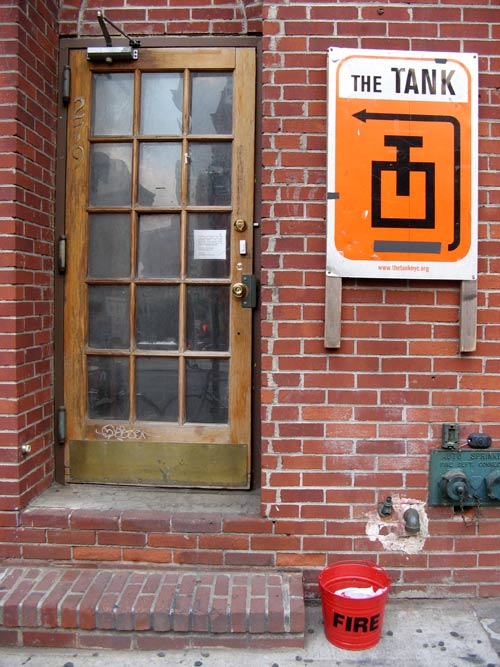
For more, view the 13-minute video on Nicaraguan coffee farmers, produced by Equal Exchange, the largest for-profit Fair Trade company in the United States.
The decision to seek out Fair Trade Certified products makes an important and tangible difference in people’s lives. At the Q&A afterwards, with representatives from the New York Fair Trade Coalition and The Fair Trade Resource Network, much of the discussion revolved around Seattle-based juggernaut Starbucks.
SBUX corporate policy dictates that the company will brew a fresh cup of Fair Trade coffee for you upon request – a challenge taken up by several bloggers. In practice, though, the request is usually greeted with perplexed looks – and no Fair Trade coffee. (We tried this ourselves over the next couple of weeks in the financial district outlets with similar results.) According to a 2006 press release (.pdf), the company is committed to fair trade and to paying producers equitable prices for all of their coffee, which are often substantially above the prevailing commodity-grade as set by New York – regardless of labels and certifications.
In 2003, at the nadir of the coffee price slump, Dunkin’ Donuts became the first national brand to use exclusively Fair Trade Certified coffee in all their espresso-based beverages. Humanitarian agency Oxfam applauded the efforts, but note that the policy applies to espresso beverages only, which account for about 2% of the company’s coffee bean purchases. Baby steps.
The post-film reception of coffee, cookies and brownies:
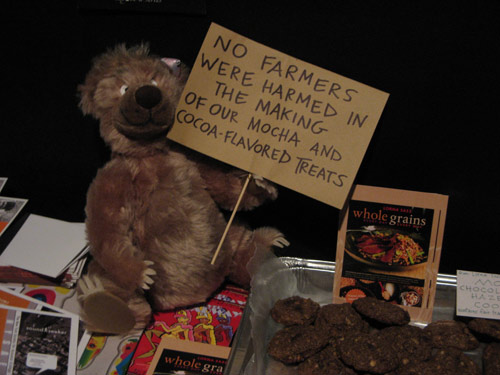
For an alternate view, read the recent Economist article arguing against Fair Trade on an economic basis, as it interferes with the invisible hand of the market.
E Pluribus Venom
At a reception for Shepard Fairey’s “E Pluribus Venom” show at the Jonathan Levine Gallery — on view through July 21, 2007.
As a risd undergrad in 1989, Fairey launched his “OBEY GIANT” street sticker campaign, which he dubbed “an experiment in phenomenology.” The experiment was a tremendous success: throughout the 1990s, the silk-screened visage of André the Giant turned up unexpectedly on streetlights, sidewalks and buildings around the world.
From those grassroots beginnings, Fairey built a clothing line, a design firm and a lifestyle magazine, and solidified his place in the pop art world with his street art, Fender guitars, album covers, and movie posters — including the one for 2006’s Walk the Line.
Fairey’s new exhibit includes small to large-scale, politically-charged paintings, prints, and mixed media pieces rich in metaphor. Its title, which translates to “out of many, poison,” is derived from the motto that appears on most American currency.
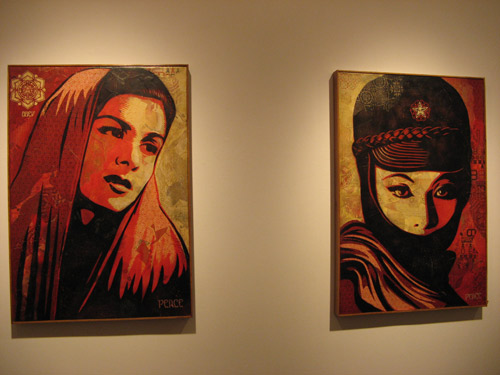
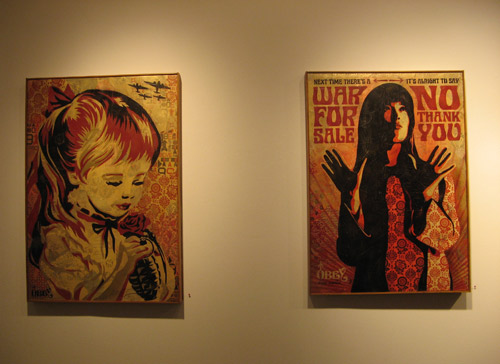
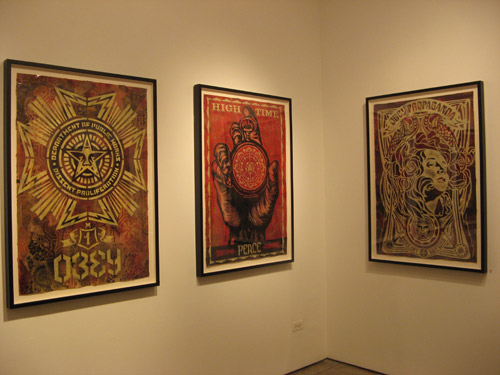
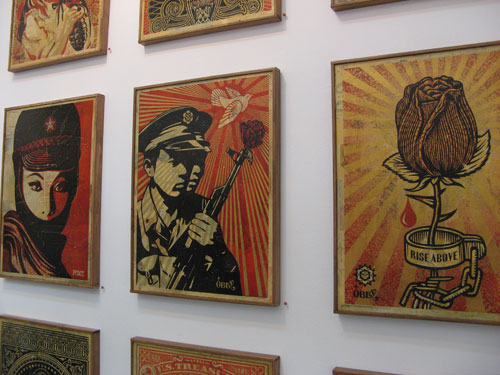
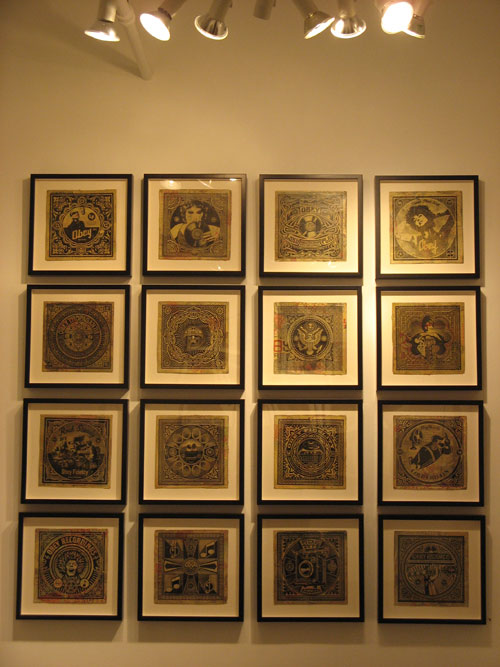
Levine was on hand to offer a brief presentation on Fairey’s works. Judging from the buzz of the crowd tonight and the ubiquitous red pushpins – indicating pieces already claimed for purchase – the show was a smash hit.
Joshua
The final film seminar of the season: Joshua, starring starring Sam Rockwell and Vera Farmiga as a perfect, privileged Manhattan couple, and Jacob Korgan as their 9-year old son, who has difficulty adjusting to the arrival of his new baby sister. Another film in the creepy-kid genre – see The Bad Seed and The Omen — which I tend to find too preternaturally disturbing to enjoy even when done well, which was not the case here.
At the post-film discussion: co-stars Celia Weston and Dallas Roberts.
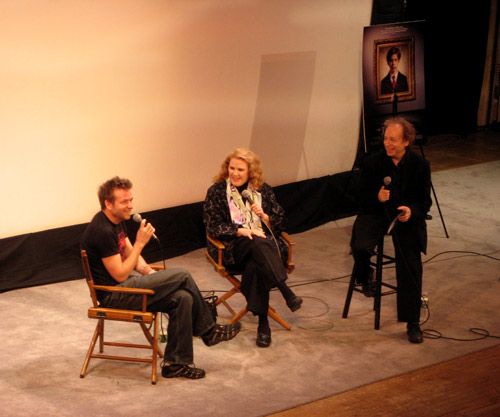
It took me a few minutes, but I finally recognized Roberts from 2004’s A Home at the End of the World – the independent film adaptation of a Michael Cunningham novel, perhaps better known as “that movie where [Colin Farrell]’s naked but it was apparently ‘too distracting’ so they’ve cut it out.” (Yeah, seriously.)
I’d seen Weston in perhaps a dozen film and television appearances without ever knowing her real name – a level of fame just short of stardom that the now-hiatused Fametracker.com used to refer to aptly as “Hey! It’s That Guy!”
When asked what inspired them to take on their respective roles of a flamboyant gay uncle and an evangelical Christian grandmother, Roberts jokingly (but candidly) responded, “Money is a great motivator.” Weston, for her part, concurred, citing one film part she had been hesitant to accept after reading the script, but ultimately, was glad she did; the movie went on become a “cash cow of residual checks,” thanks to its endless airings on television. Despite our pleadings, she tactfully refused to name the film. I’m pretty sure she was referring to How to Lose a Guy in Ten Days.
Search
Popular Tags
Categories
Archive
- July 2010
- July 2009
- January 2009
- November 2008
- September 2008
- August 2008
- July 2008
- June 2008
- May 2008
- April 2008
- March 2008
- February 2008
- January 2008
- December 2007
- November 2007
- October 2007
- September 2007
- August 2007
- July 2007
- June 2007
- May 2007
- April 2007
- March 2007
- February 2007
- January 2007
- December 2006
- November 2006
- October 2006
- September 2006
- August 2006
- July 2006
- June 2006